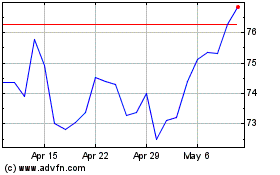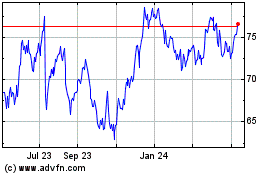By Justin Baer
The shares of many publicly traded asset managers and banks with
related businesses have tumbled in October as firms from BlackRock
Inc. to State Street Corp. reported lackluster third-quarter
results. Franklin Resources Ltd., parent of Franklin Templeton
Investments, joined those firms Thursday in reporting quarterly
revenue that fell short of Wall Street's expectations.
These declines represent an ominous signal that money managers
are sending to their fellow investors, suggesting recent hiccups in
the stock market could be early symptoms of a deeper ailment.
The broader market has also tumbled. Even with a bounce
Thursday, the S&P 500 index has dropped over 7% in October,
putting the benchmark on pace for one of its worst months since
February 2009.
The asset management declines have been greater than the
market's and have a common culprit: cautious clients. Some
money-management shareholders worry that investor tolerance has
shifted against the market. And these asset managers' performance
will suffer if they cease to be buoyed by a market rally now
closing in on its 10th anniversary.
"What's the incentive for people to buy stock in an asset
manager?" said Loren Starr, finance chief at money manager Invesco
Ltd. "It has a lot to do with your expectations -- or fears -- on
the market going forward, and if we're going to see a further
decline."
U.S. stocks rose Thursday, rebounding somewhat from a
day-earlier selloff that had wiped out this year's gains in both
the S&P 500 and Dow Jones Industrial Average. Those benchmarks
are still down by more than 2% for the week.
Shares of BlackRock, the world's largest asset manager, and
State Street, a custody bank that caters to investment firms, are
each down nearly 20% in October, marking their biggest monthly
declines in 10 and nine years, respectively. T. Rowe Price Group
Inc. has fallen 14%.
"On the back of a nine-year bull run, we're starting to see
investors take risk off the table," said Joseph Hooley, chairman
and chief executive of State Street. "When investors do that, they
move to lower-risk assets."
Such assets include cash and short-term bond funds. Notably,
U.S. money-market funds had their biggest net inflow during the
third quarter since the last three months of 2014, according to
Morningstar.
This rotation is particularly bad for most asset managers and
the custody banks charged with keeping those firms' books. Managers
tend to charge higher fees on funds that focus on riskier assets,
like emerging-market stocks. When investors push more of their
money into safer -- and lower-cost -- investments, it cuts into the
fees they pay managers.
BlackRock, Invesco, State Street, Bank of New York Mellon Corp.
and Franklin were among the asset managers and custodians to post
quarterly revenue that missed analysts' average estimates,
according to S&P Global Market Intelligence.
That the current swoon for asset managers isn't limited to stock
pickers and other so-called active funds hints at what might be in
store for stocks. Those firms have been buoyed by the surging
popularity of exchange-traded funds and other low-cost,
index-linked investments.
But BlackRock, the top ETF seller, reported last week that
client withdrawals in the third quarter had exceeded new money for
the first time in three years.
"We're seeing more and more clients just pausing," BlackRock CEO
Laurence Fink said in an interview.
The end of a market's bull run will lead to even harder days
ahead for many asset managers, which derive their fees from the
amount of assets they manage. When markets fall, the value of the
assets -- and the amount of revenue they produce from fees --
declines, too.
"It's a tough thing for an asset manager when revenues are going
down with the market and expenses just don't move as quickly," Mr.
Starr said.
Lazard Ltd. reported a 4% decline in quarterly revenue from the
investment bank's asset-management arm on Thursday. The division's
assets under management had fallen by $10 billion, to about $230
billion, in less than three weeks since the start of October, said
finance chief Evan Russo.
Some managers are preparing for worse, according to
analysts.
When Invesco unveiled its $5.7 billion acquisition of rival
OppenheimerFunds Inc. last week, the firm's executives said they
expected to slash annual expenses by $475 million as a result of
the deal. The figure seemed high to analysts, and several pressed
Invesco investors on the matter during a conference call.
"To me, what they were saying was, 'We're going to use this as
an opportunity to clean house'" before conditions worsen, said UBS
Group AG analyst Brennan Hawken.
Mr. Starr said that wasn't the case, noting the number includes
some cost cuts Oppenheimer had already planned to make before its
deal with Invesco.
He said investment firms -- and the market itself -- may have
hit a rough patch. But more volatile markets should make it easier
for active managers to outperform major indexes -- and the passive
funds that track them. If they do, they might win back some of the
client money that defected to index funds and ETFs during the
rally.
"The dynamic is negative in the short-term, but in the long term
it has a positive, silver lining," said Mr. Starr, whose firm has
both active and passive businesses. "It really does feel like a
transition is setting up."
Write to Justin Baer at justin.baer@wsj.com
(END) Dow Jones Newswires
October 25, 2018 14:21 ET (18:21 GMT)
Copyright (c) 2018 Dow Jones & Company, Inc.
State Street (NYSE:STT)
Historical Stock Chart
From May 2024 to Jun 2024

State Street (NYSE:STT)
Historical Stock Chart
From Jun 2023 to Jun 2024
